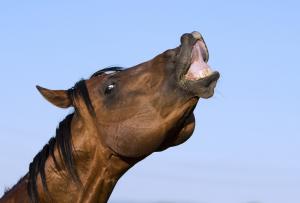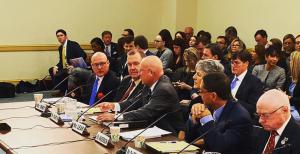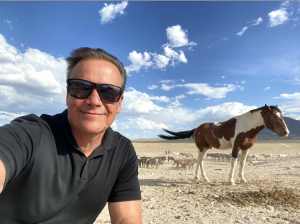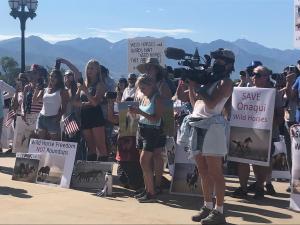Congressional Debate on Horse Slaughter, Treatment of Iconic American Wild Horses, and Welfare of Racehorses Continues
Animal Wellness Action, Center for a Humane Economy, Animal Wellness Foundation Push Congress to Permanently End Slaughter and Transport of Horses for Slaughter
The substance of the SAFE Act has been introduced in each Congress for the past two decades. SAFE would bring an end to the gruesome trade in horse meat and the slaughter of American equines shipped to Mexico and Canada – some 23,000 of them in 2021. Animal Wellness Action (AWA), Animal Wellness Foundation (AWF), and Center for a Humane Economy (CHE) leaders have long pressed for passage of SAFE, and this action on the legislation comes on the heels of an AWA-conceived anti-slaughter amendment to President Joe Biden's signature infrastructure package that passed the House in June of 2021.
AWA executive director Marty Irby, who testified before Schakowsky's Subcommittee in person in 2013 and again in 2020, and AWA's and CHE's director of campaigns, Scott Beckstead, submitted written testimony and materials to the Subcommittee in support of SAFE.
“Allowing our horses to be shipped across the border to be slaughtered for the sake of foreign meat companies is an un-American betrayal of a good and trusted friend,” said Scott Beckstead, director of campaigns for the Center for a Humane Economy. “It’s time to align our deep love and respect for our equines with federal law by passing the SAFE Act.”
“These bills include the SAFE Act that I introduced with Rep. Buchanan," said Chairwoman Jan Schakowsky, D-Ill during the hearing. "This legislation will protect horses from being slaughtered for human consumption. Horse slaughter is not only inherently cruel but is also very dangerous. Horse meat can be toxic."
"Our iconic American equines who've served us in work and sport, many who have been discarded after their racing careers were over or removed from federal lands by the Bureau of Land Management, deserve better than to be served up as slabs of meat on foreign dinner plates in countries like China and Japan," said Marty Irby, executive director at Animal Wellness Action, and an 8-time world champion equestrian who was honored by Her Majesty Queen Elizabeth, II in 2020 for his work to protect horses. "We applaud Chairwoman Schakowsky, and Rep. Vern Buchanan for their leadership to permanently end the gruesome slaughter of horses on U.S. soil."
The SAFE Act, H.R. 3355/S. 2732, introduced in the 117th Congress by U.S. Sens. Bob Menendez, D-N.J., and Lindsey Graham, R-S.C., and Reps. Schakowsky and Vern Buchanan, R-Fla., would permanently ban the transport of horses bound for slaughter. A similar bill to ban horse slaughter saw a hearing in the previous Congress in the Health Subcommittee, but no further action occurred beyond that in either chamber.
In 2021, the AWA conceived transport amendment, an alternative anti-slaughter measure led by Reps. Troy Carter, D-La., Brian Fitzpatrick, R-Pa., John Katko, R-N.Y., Schakowsky, Cohen, and Rep. Dina Titus, D-N.V., passed the House by a voice vote with little to no opposition. The Members who introduced the legislation were joined by cosponsors that included co-chairs of the Congressional Horse Protection Caucus Andy Barr, R-Ky., and Paul Tonko, D-N.Y., and cochairs of the Congressional Animal Protection Caucus Vern Buchanan, and Earl Blumenauer, D-Ore. It would have simply banned the transport of equines across state and federal lines for the purposes of slaughter.
The 2021 measure was endorsed by more than 225 equine related businesses, groups, organizations, and a wide array of stake holders that included The Jockey Club, The Breeders’ Cup, Water, Hay Oats Alliance, New York Racing Association, Team Valor, Hall of Fame jockey Chris McCarron, and others. Unfortunately, just like the American Horse Slaughter Prevention Act did when it passed the House in 2006, the measure died in the U.S. Senate, where it continues to be an uphill battle to pass horse protection legislation in the 117th Congress.
Marty Irby
Animal Wellness Action
+1 202-821-5686
email us here
Visit us on social media:
Facebook
Twitter
Reps. Steve Cohen and Jared Huffman grill the USGS about the fate of wild horses
Legal Disclaimer:
EIN Presswire provides this news content "as is" without warranty of any kind. We do not accept any responsibility or liability for the accuracy, content, images, videos, licenses, completeness, legality, or reliability of the information contained in this article. If you have any complaints or copyright issues related to this article, kindly contact the author above.





